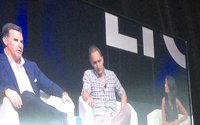Under Armour: Advertising Saved Our Company
- by Larissa Faw , June 23, 2016

Under Armour (UA) may be a $5 billion company, but at one point, the athletic brand didn't even have enough money to float free merchandise, says founder/CEO Kevin Plank during a conversation with David Droga, UA's AOR Droga5 during the Cannes Lions 2016. "When you are growing a company, not everything grows at the same time."
Under Armour launched its first national campaign in December 1999 by spending $25,000 on a half-page ad in ESPN magazine. This push was a result of landing a product placement deal in Oliver Stone's Any Given Sunday and Plank wanted to make sure people knew that UA was a real and not fictional brand. "They paid for every shirt that went there."
The first ad underscored Under Armour's image with a "huge dude" wearing a Darth Vadar-type helmet. From that one ad, UA received 8,000 direct response calls resulting in $800,000 in sales in three weeks. "We only made $1.3 million the year before," he says.
advertisement
advertisement
Plank became the company’s in-house advertising expert. "I thought I was smart in advertising since the answer to everything was all I need to do is run one half-page ad," he jokes. "Big idea? Another half-page ad in a magazine."
The second print ad - featuring a looser fitting shirt with "not quite the attitude" -garnered only 35 phone calls, says Plank. "Lesson learned? We basically tapped the vein of a market." Of the one million ESPN magazine readers, UA landed the "8,000 zealots. And that first 8,000 [spent] money. We already talked to the easy ones to find," comparing it to the "only time you notice car commercials is when you want to buy a car."
This mindset infects many brands, he says. "You have success and push replay. You try to replay the same thing again and again." Still, UA's initial strategy was aimed at capturing the "lowest hanging fruit first" with ads in Men's Journal, Men's Health and Men's Fitness.
UA continued to develop its advertising in-house until three years ago. "I did every single thing," he says. "I would sleep on sets, sit in commercial suites." But he realized an outside agency provides a viewpoint UA lacks. "We have a perspective exclusive to our way of seeing things." Outside agencies, by comparison, give UA a "broader view of how we see the world and how the world sees us."
Droga was an obvious decision as AOR as both companies maintain challenger outsider mindsets. Droga and Plank also share unique backgrounds after they both were raised in five children households. (In fact, Droga5 was selected as the agency name because his mom would write Droga5 on his clothing to differentiate from his brothers.) Both are used to being the "lowest man on the totem pole," says Plank. "You want to prove you came to play."
UA was a difficult partner, he says. "We sucked as a client because we didn't know how to work for an agency." He didn't trust his company to anyone else. For years, he sweated over every single detail, including having final cut and final edit. "That was my role in the company [and it was hard] giving up that role," he says. "The hardest thing about being a leader is delegation." But the "company is on the line." He knew he finally trusted Droga when his coworkers asked his opinion and he asked them for Droga’s response. "I believe he has an understanding of our brand that we don't." UA gives Droga 'the run of the place" until "we run lousy a campaign," he says.
UA's learning curve in client-agency relationships is instructive for all advertisers, says Plank. "Sometimes they just don't know." Companies may not understand proper protocol. Clients may not know what is appropriate and inappropriate behaviors, like not sitting in the edit bay or how long the development process actually is.
UA isn't marketing a message but rather conveying its core ethos. "The brand is everything," says Plank. "You just can't have things creative for creative sake," he says. "We have a great product and strong point of view." Nothing can be one off. "Brand brand brand," says Plank. “Marketing is the same way we run our meetings. ‘This is what I heard, this is what we think and this is how we articulate or run the play.’"
UA is laughing off the massive negative response to Stephen Curry's white "nurse" shoes that debuted during the recent NBA Finals. "The normal client behavior is to panic, retreat, retract and deny," says Droga. However, UA thought it was an amazing opportunity. "How do you make something great out of a hiccup?" says Droga.
UA was thrilled with the free attention. "The worst thing in life is to be apathetic. You get invited to a party and no one cares that you showed up." Instead, regardless of whether it is good or bad, UA is part of the conversation. "They finally care."


